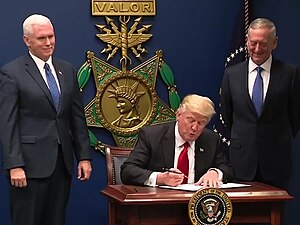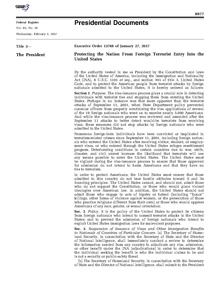Executive Order 13769
| Protecting the Nation from Foreign Terrorist Entry into the United States | |
 |
|

U.S. President Donald Trump signing the order at the Pentagon, with Vice President Mike Pence (left) and Secretary of Defense James Mattis (right) at his side.
|
|

Executive Order 13769 in the Federal Register
|
|
| Type | Executive Order |
|---|---|
| Executive Order number | 13769 |
| Signed by | Donald Trump on January 27, 2017 |
| Federal Register details | |
| Federal Register document number | 2017-02281 |
| Publication date | 1 February 2017 |
| Document citation | 82 FR 8977 |
| Summary | |
* Not in force as of March 7, 2017[update]
|
|
Executive Order 13769, titled Protecting the Nation from Foreign Terrorist Entry into the United States, was an executive order issued by United States President Donald Trump in effect, except to the extent blocked by various courts, from January 27, 2017 until March 16, 2017, the effective date of Executive Order 13780. Executive Order 13769 lowered the number of refugees to be admitted into the United States in 2017 to 50,000, suspended the U.S. Refugee Admissions Program (USRAP) for 120 days, suspended the entry of Syrian refugees indefinitely, directed some cabinet secretaries to suspend entry of nationals from Iran, Iraq, Libya, Somalia, Sudan, Syria, and Yemen, and included exceptions on a case-by-case basis.
The order was seen as fulfilling Trump's campaign pledge for a "complete shutdown of Muslims entering the United States until our country's representatives can figure out what is going on". The Administration said its intent was only to exclude likely terrorists, and not to single out Muslims.
Immediately, there were numerous protests and legal challenges. A nationwide temporary restraining order (TRO) was issued on February 3, 2017 in the case Washington v. Trump, which was upheld by the United States Court of Appeals for the Ninth Circuit on February 9, 2017. Consequently, the Department of Homeland Security (DHS) stopped enforcing portions of the order and the State Department re-validated visas that had been previously revoked. The order was criticized by members of Congress from both parties, universities, business leaders, Catholic bishops, top United Nations officials, a group of 40 Nobel laureates, Jewish organizations, 1,000 U.S. diplomats who signed a dissent cable, thousands of academics, and longstanding U.S. allies. The order was criticized because it was seen by man as a "Muslim ban" and because of the number of people negatively impacted. More than 700 travelers were detained and up to 60,000 visas were "provisionally revoked" while some academics suggested there was no empirical evidence that immigration increases crime in the United States.
...
Wikipedia
